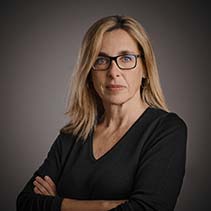
Dr. Àngels Fitó (born Barcelona, 1970) has a PhD in Business and Economics from the University of Barcelona, is a full professor at the UOC, and has been Vice President for Competitiveness and Employability since 2019 until 2023. She combined her teaching work with a professional career in accounting and tax consulting for private companies and public institutions. She has also been deputy chair of the Catalan Professional Association of Economists since November 2021, and a member of the Government of Catalonia's Economic Policy Advisory Board.

Teresa Guasch has a PhD in Psychology from Ramon Llull University (URL, 2003) and a degree in Educational Psychology. She also has postgraduate qualifications in Educational Psychology for Diversity in Schools from the Universitat Autònoma de Barcelona (UAB, 1997) and Curricular Guidance for Teaching and Learning Strategies from the URL, UAB and UOC (1999). Guasch has been dean of the Faculty of Psychology and Education Sciences since 2014 and is a senior professor at the UOC. Her research and innovation activities focus on the study of teaching and learning processes in virtual environments from an educational psychology perspective.

Vilajosana has a PhD in Computing from the UOC and the Universitat Politècnica de Catalunya. He is a professor, and lead researcher in the Wireless Networks (WINE) research group at the IN3. He was recently awarded an ICREA Acadèmia grant. He has developed 32 patents, 26 of which are already in use at multinational corporations, and he has taken part in the creation of a number of start-ups.

M. Jesús Martínez-Argüelles has a PhD in Economics and Business from the University of Barcelona, and master's degrees in Industrial Quality from Spain's National Distance Education University, and in Economics from Pompeu Fabra University. She has been dean of the Faculty of Economics and Business since 2019. Before that, she had been a member of the faculty (2000 to 2019), associate professor of Business Organization (2008 to 2019), and associate dean for teaching (2016 to 2019).

Manel Jiménez-Morales has been a professor of Cinema and Television at Pompeu Fabra University (UPF) since 2000. He has a PhD in Social Communication, alongside a master's degree in Advanced Studies in Social Communication and two degrees in Audiovisual Communication (UPF) and Comparative Literature from the University of Barcelona. He has been a visiting scholar in the Department of Literature at the University of Oxford, and the School of Theater, Film, and Television at the University of California, Los Angeles (UCLA), and a researcher at the British Film Institute in London. Until 2023, he had been Vice Rector for Educational Transformation, Culture and Communication at the UPF and a member of the European University Association's Learning & Teaching Steering Committee.
- The rector is the highest academic authority at the University and, thus, takes on the corresponding responsibilities for representing and governing the University, without prejudice to those responsibilities assigned in the Statutes to the Board of Trustees.
- The appointment and dismissal of the rector has to be ratified by the Catalan government, at the behest of the Foundation’s Board of Trustees, in accordance with the procedure established in the Statutes, after having heard the Council.
- The rector chairs the Governing Council and any other meetings of the University’s governing bodies, apart from the Board of Trustees, the Standing Committee and the Council of the Foundation for the Universitat Oberta de Catalunya.
- The rector, or the person they delegate, attends the meetings of the Board of Trustees and the Standing Committee of the Foundation for the Universitat Oberta de Catalunya, in an advisory capacity.
- The rector of the Universitat Oberta de Catalunya shall be appointed by an absolute majority vote of the trustees and shall remain in office for a maximum of seven years, without the possibility of extension, in accordance with that established in the Foundation’s Statutes, and after having heard the research and teaching staff.
- The rector of the Universitat Oberta de Catalunya must have a doctoral degree.
- The rector is assisted in their duties by the vice rectors. The rector shall determine how many vice rectors there will be. The rector shall appoint, dismiss and assign functions to the vice rectors in accordance with the regulations.
- The vice rectors are full members of the Governing Council.
- If the rector is absent or ill or if the position is vacant, their functions shall temporarily be covered by the vice rector they have delegated to or, should they not have done so, to the vice rector with greatest seniority.
